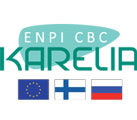The concept of the Green Belt of Fennoscandia (GBF) emerged early in the 1990s, born through international cooperation for implementation of the principles of sustainable development in border areas, implying a balanced combination of the interests of the society, economic development and nature conservation. GBF is a strip of territory stretching along the Russian-Finnish (in the north also Norwegian) border. The core areas of GBF are operating and planned protected areas (PAs) on both sides of the border, which are ecologically linked with the pan-European environmental network (Natura 2000). In terms of its environmental, conservation and recreational qualities this unique nature object is of global value. In 2010, the Memorandum of Understanding on cooperation on the development of the GBF was signed by the governments of the three countries involved (Russia, Finland, and Norway).
Meanwhile, the environmental situation in some districts and municipalities calls for improvement through wise and sustainable management. The activities of logging and other enterprises, poaching, frontier engineering facilities cause animal populations to decline. Basic population management principles worked out by scientists are hardly ever implemented. At the same time, wildlife, including fish, is to be treated as an international resource and managed jointly by neighbour states. The efforts to promote the recreational potential of the territory (especially in Karelia) lack efficiency, and its contribution to the economy is minor. The nature of the territory being highly attractive, the infrastructure, information support and services to organized hunters, fishermen and tourists are underdeveloped. Activities should also be built up in PAs (core areas of GBF), especially now that Russian legislation has been modified to allow educational tourism in PAs. The cross-border potential of GBF, which may trigger sustainable development in border areas, is not utilized to the full either.
IntellGreenBelt project will suggest a number of cross-border solutions for conservation and reproduction of natural resources (e.g. ecological corridors) that would also activate socio-economic activities on both sides of the border (hunting, fishing, recreation, educational tourism). To approach its goals the project will employ international (Finnish and Swedish) expertise, and interact with related ENPI and other projects.
Thematically, the project comprises 4 work packages. The first one consists in establishing the specializations and functional zoning of pilot areas, delineation and mapping of ecological corridors, feasibility study of the Tulos Landscape Reserve. WP2 deals with sustainable management of game animals, and WP3 with sustainable use and reproduction of fish resources, and development of fisheries. WP4 is targeted at promotion of PA-based educational and learning tourism, biosphere reserve planning.
Within the IntellGreenBelt project intellectually-driven models and know-how for sustainable management of natural resources will be introduced in the GBF pilot areas. Innovative approaches will be worked out to make the operation of PAs more efficient through development of hunting, amateur fishing, recreational and learning tourism.
The project will produce the maps and conservation regimens for cross-border ecological corridors (wildlife linkages). The feasibility study will be prepared for the Tulos landscape reserve. Also, development plans will be prepared for public and private hunting farms, management models and up-to-date practices of sustainable use and reproduction of fish and game resources will be worked out. Concepts for the development of educational and learning tourism in pilot PAs will be prepared.
The project will provide information support to hunters, fishermen and tourists, and implement a number of small-scale infrastructure-building projects in selected sites.
The sustainable nature use models produced within the project will be applied by decision-makers, executive authorities, NGOs, private companies and other project target groups.
 |
 |
 |
 |
 |
 |



